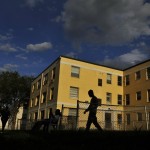Citing government studies, The Boston Glove is reporting that the immigration court “logjam” has more than doubled over the past decade, to include about a half-million cases including 11,271 cases in Boston,
“As a result, some respondents’ cases may take years to resolve,” government auditors said in the June 1 report on the Justice Department’s Executive Office for Immigration Review, which oversees the immigration court system.
The Globe story focuses on a woman, her husband, and their two children who “… fled war-torn Syria in 2013, moving first to Lebanon before arriving legally in Massachusetts in March 2014. They applied for asylum, were granted temporary permission to stay, and were given work permits. So far, however, they have no idea how long they’ll be allowed to remain in the United States. Or even if they will.”
The reporting cites several causes for the backlog, including too few judges and the 2014 jump in people seeing refuge here. Immigration courts are considered “civil,” rather than criminal and thus do not have to provide lawyers and other protections. The courts are not part of the federal courts system but are a function of the Justice Department.
Read the Globe story here: At immigration courts, a growing backlog – The Boston Globe
Boston Globe Deep-Dives Into Immigration Court Delays
Civil Courts Deciding New Orleans Charter-School Segregation Issue
Civil lawsuits are as much a part of America’s charter school landscape as blackboards and parental ire, and the 5th U.S. Circuit Court of Appeals in New Orleans is one of the latest battlegrounds. At issue is the Greater Grace Charter Academy a bit west of New Orleans that is 93 percent black enrollment, but where the population is only 62 percent black, according to the Associated Press.
In a report posted on the NOLA news website, the AP says that “… Louisiana’s education board approved the school’s charter and U.S. District Judge Martin Feldman allowed the opening last August. He noted the school has a non-discriminatory enrollment policy. He said blocking the opening would punish students who chose to enroll there. Opponents argue that approving a nearly one-race school ‘is contrary to the goals of desegregation.'”
Arguments are expected to be heard this month. Read the AP report here:
Charter school segregation lawsuit goes to U.S. appeals court
Report: Half of Californians Worry Somebody They Know Will Be Deported
A new report by the Capital & Main group, published at Newsweek, outlines how deeply the immigration and deportation issues are felt in California. The report also notes that”… fifty-one percent of California adults said increased federal immigration enforcement left them worried that someone they know could be deported, according to the survey from the Public Policy Institute of California. Thirty percent said they worry ‘a lot’ about it, according to the poll.
The report also notes that, under President Trump, “… deportations have actually fallen…compared with the same time period last year, but the number of arrests of undocumented immigrants has increased. Some of those people are owed a day in court, and the immigration courts are backlogged with pending cases.”
The immigration cours are designated as “civil” cases, as opposed to criminal cases. One difference is that people in civil cases lack the guarantee of a lawyer.
See the story here: http://www.newsweek.com/half-california-adults-believe-someone-know-deported-trump-619282
Getting Deported Back to Haiti Almost Killed Me
The ongoing debates over United States immigration and refugee policy is bringing many personal stories into the spotlight, mostly featuring immediate concerns. But VICE is offering a compelling story of a South Florida man who was deported back to Haiti at the age of 22. The story is counter-intuitive in many ways – he prefers Reagan to Clinton as American presidents go and offers mixed feelings about how Florida would have worked out.
Now Jean Pierre Marseille is described as a “journalist, fixer, translator, salesman” and “jack of all trades.” His story offers a lesson in how policy translates into personal history, and you can find it here:
D.C. Among Those Talking ‘Civil Gideon’ for Evictions

At some D.C. apartments, where tenants are overwhelmingly poor and recipients of housing vouchers, any violation of the lease — even walking your dog without a collar — becomes grounds for a suit for eviction. But far more common is suing over nonpayment of rent. Shown is Brookland Manor, a low-income housing complex that is undergoing redevelopment. (Michael S. Williamson/The Washington Post)
A trio of Washington, D.C., council members are making the case for a limited “civil Gideon” provision for District residents facing evictions. In a Washington Post op/ed, the three Democrats admit that their city might one considered already “tenant friendly” but that the legal policy is needed.
“Many tenants are pressured by lawyers representing their landlords to settle their case in the hallways outside of the courtrooms,” they write. “If you don’t understand the legalese, it’s hard to know what’s happening to you and it’s almost impossible to know what your options are. All the while, you just want to avoid becoming homeless.
The offer these stats: Of the 33,000 eviction cases filed annually in the District, fewer than 10 percent of tenants have legal representation during an eviction hearing; more than 90 percent of landlords are represented.
For background, they note a national movement: “… this is a small part of a larger national trend called ‘civil Gideon,’ a nod to the case that established the right to counsel for criminal defendants and is now a growing movement to create a right to counsel in civil cases.
See the piece here: Opinion | Low-income tenants in D.C. may soon get legal help

